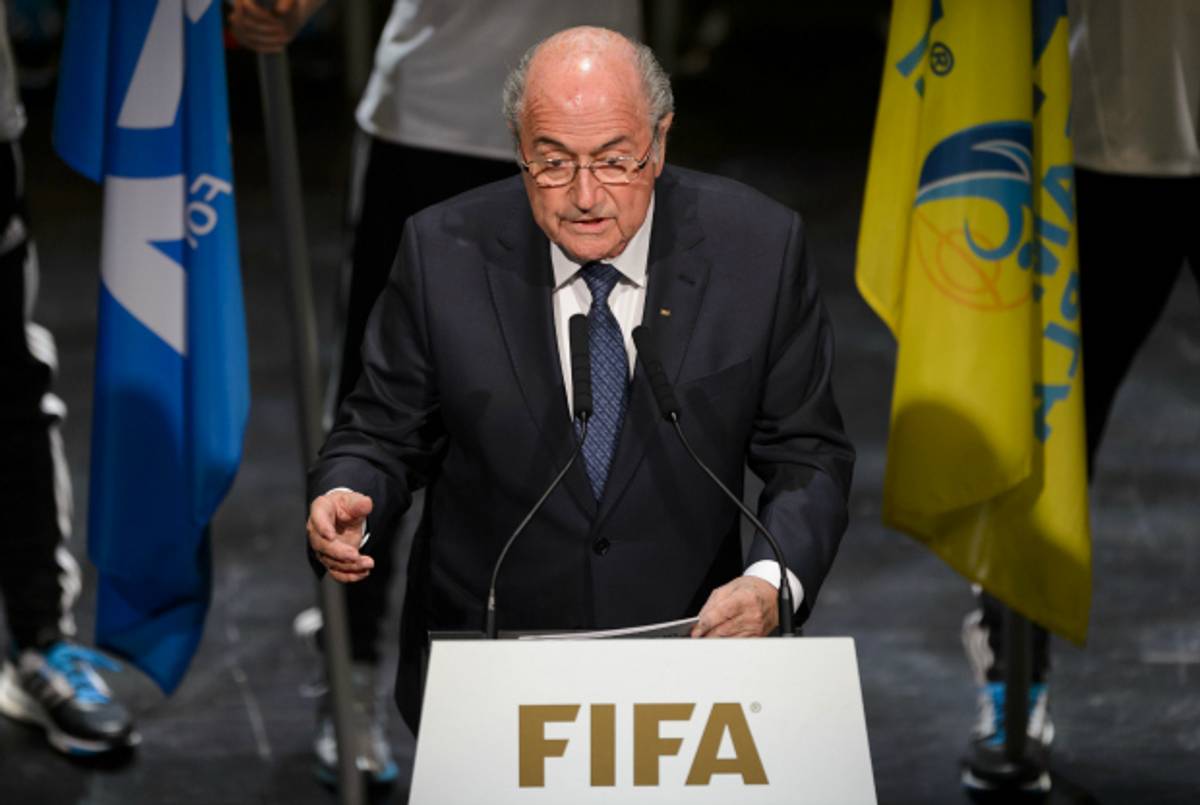
It’s been quite a week for FIFA, the worldwide governing body of professional soccer. On Wednesday, as the organization gathered in Zurich for its annual congress, 14 officials were arrested on charges of corruption, including bribery, “racketeering, wire fraud and money laundering conspiracy,” reports the New York Times. In the midst of this crisis, and even overshadowing it, the Palestinian Football Association has pushed forward a proposal that calls for the suspension of the Israel Football Association from FIFA; delegates from the organization’s 209 member federations will vote on the matter on Friday.
This is the third year in a row that Jibril Rajoub, the FIFA delegate for the Palestinian Football Association, has put forth the motion. In the past, embattled FIFA president Sepp Blatter has managed to convince Rajoub to rescind the appeal. But this year, Blatter was unsuccessful.
“Rajoub is not backing down, despite many ‘direct and indirect threats’ he says he has received and what he describes as increasingly inappropriate treatment he receives from Israel,” Time magazine reports.
Rajoub’s motivation for pushing the appeal this year stems from the negative impact Israel’s occupation of the West Bank has had on Palestinian soccer. “Palestinian players often cannot travel between Gaza and the West Bank for training camps or practices, a result of Israel’s blockade of Gaza, under Hamas’s control, which began in 2007,” reports Vice.
Aside from the restrictions on Palestinian player movements in and out of the Gaza Strip, the PFA also claims that “hundreds of thousands of dollars worth of equipment have been held at the border for inspection past the time it was to be used for matches.”
In an op-ed for the Guardian, Rajoub highlighted the hatred Palestinian players have faced from supporters of the Israeli soccer team, Beitar Jerusalem:
Participation of a Palestinian or Muslim during a match against Beitar Jerusalem has been met with chants of “Death to Arabs” from the stands, the crowd encouraged by the failure of the Israel Football Association to properly sanction the club for its fans’ behaviour.
According to Al Jazeera, Rajoub will be successful only if 75% of the 209 delegates at the congress vote in support of the motion. The resulting suspension would prevent Israel from participating in the qualifiers for the Euro 2016 competition, but of course, the suspension’s symbolic meaning has far greater significance. It would reinforce the comparison proponents of the BDS movement make between the policies of modern Israel and apartheid-era South Africa. In 1964, FIFA expelled the South African Football Association for its country’s racism.
Today, the New York Times ran an op-ed by Iyad Abu Ghargoud, a footballer on the Palestinian national team. He writes that soccer in the Middle East “will be a beautiful game only when all men, women and children in the Holy Land are seen as equals.”
The Israeli Football Association responded to the Palestinian appeal by criticizing Rajoub for unjustly using sport as a vehicle for politics. Vice quotes a senior IFA official who said that “Rajoub knows that by using this topic, it gives him a lot of media attention and power.”
Last week, an organization called The New Organization of Football Players in Israel uploaded a video to YouTube titled, “One World One Ball.” It depicts Israeli soccer players of numerous ethnicities requesting that FIFA “play the ball but not the State.”
But Israel is offering a four-point list of concessions that address Rajoub’s contentions, Haaretz reported on Thursday. They read:
— Palestinian players and coaches will receive a specially identified car allowing them to travel with greater ease to Gaza from the West Bank, and from the West Bank to Israel and abroad.
— Israel would loosen restrictions and promote soccer related projects within the West Bank, including the construction of a stadium and other facilities.
— Israel would cover the costs of tax and customs Palestinians pay for importing sports gear to the West Bank through Israel–predominantly via the Ashdod seaport.
— A joint committee comprised of representatives from Israel, the Palestinian Authority and FIFA would be formed and would convene monthly to address day-to-day issues.
According to Haaretz, Rajoub is willing to accept Israeli’s concessions:
Rajoub acceded, but demanded the compromise include an article addressing the five Israeli soccer teams based in West Bank settlements. Rajoub demanded that FIFA pass the decision regarding their legality onto UN Sec.-Gen. Ban Ki-moon, who would have three months to decide whether they were within Israeli territory or not.
According to the FIFA’s regulations, teams not located within Israeli territory needed Palestinians authorization to participate in Israeli leagues. In light of the fact that the UN does not recognize the West Bank as part of Israel, the decision would de facto force Israel’s soccer federation to expel these teams from the league or run the risk of breaking FIFA’s rules.
Furthermore, Haaretz reports that Blatter is leaning “towards accepting Rajoub’s demand, in light of a desire to prevent the vote to ban Israel from taking place.”
Related: Soccer, Like Politics, Is About Corruption, Incompetence, and Obsessing With the Jews
Previous: Because Nothing Says ‘Soccer’ Like ‘Qatar’
Jas Chana is a former intern at Tablet.